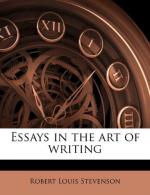This brings us by a natural transition to a very noble book—the Meditations of Marcus Aurelius. The dispassionate gravity, the noble forgetfulness of self, the tenderness of others, that are there expressed and were practised on so great a scale in the life of its writer, make this book a book quite by itself. No one can read it and not be moved. Yet it scarcely or rarely appeals to the feelings—those very mobile, those not very trusty parts of man. Its address lies further back: its lesson comes more deeply home; when you have read, you carry away with you a memory of the man himself; it is as though you had touched a loyal hand, looked into brave eyes, and made a noble friend; there is another bond on you thenceforward, binding you to life and to the love of virtue.
Wordsworth should perhaps come next. Every one has been influenced by Wordsworth, and it is hard to tell precisely how. A certain innocence, a rugged austerity of joy, a sight of the stars, ’the silence that is in the lonely hills,’ something of the cold thrill of dawn, cling to his work and give it a particular address to what is best in us. I do not know that you learn a lesson; you need not—Mill did not—agree with any one of his beliefs; and yet the spell is cast. Such are the best teachers; a dogma learned is only a new error—the old one was perhaps as good; but a spirit communicated is a perpetual possession. These best teachers climb beyond teaching to the plane of art; it is themselves, and what is best in themselves, that they communicate.
I should never forgive myself if I forgot The Egoist. It is art, if you like, but it belongs purely to didactic art, and from all the novels I have read (and I have read thousands) stands in a place by itself. Here is a Nathan for the modern David; here is a book to send the blood into men’s faces. Satire, the angry picture of human faults, is not great art; we can all be angry with our neighbour; what we want is to be shown, not his defects, of which we are too conscious, but his merits, to which we are too blind. And The Egoist is a satire; so much must be allowed; but it is a satire of a singular quality, which tells you nothing of that obvious mote, which is engaged from first to last with that invisible beam. It is yourself that is hunted down; these are your own faults that are dragged into the day and numbered, with lingering relish, with cruel cunning and precision. A young friend of Mr. Meredith’s (as I have the story) came to him in an agony. ‘This is too bad of you,’ he cried. ‘Willoughby is me!’ ’No, my dear fellow,’ said the author; ‘he is all of us.’
I have read The Egoist five or six times myself, and I mean to read it again; for I am like the young friend of the anecdote—I think Willoughby an unmanly but a very serviceable exposure of myself.




